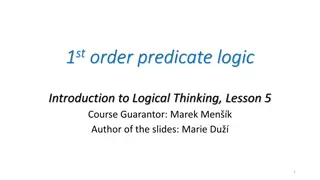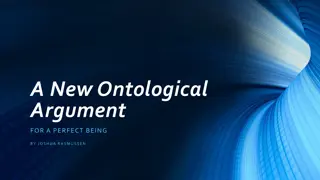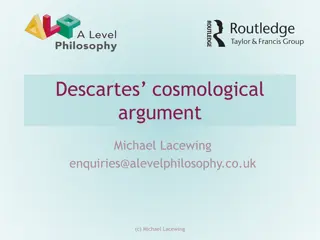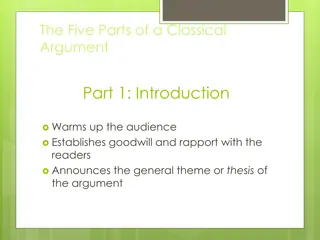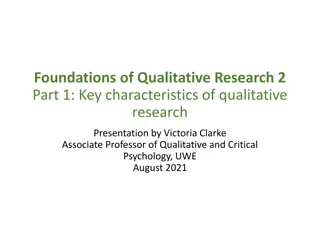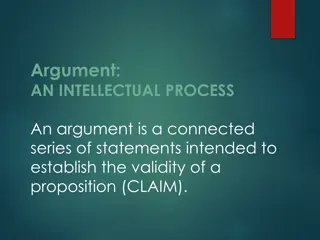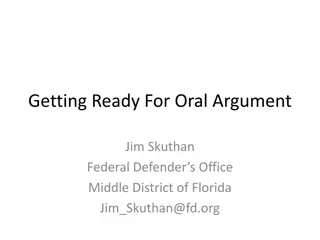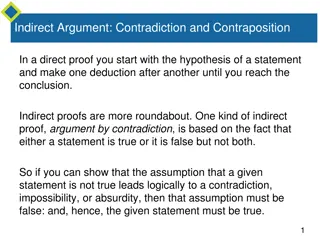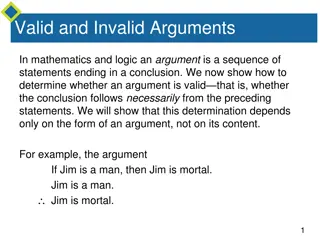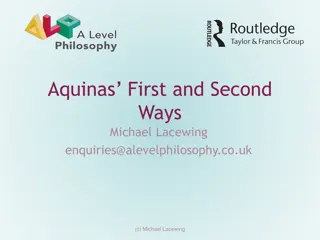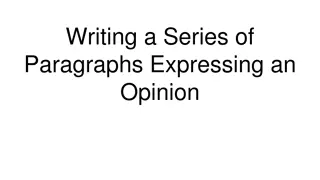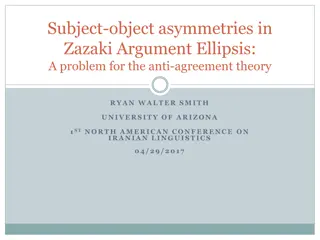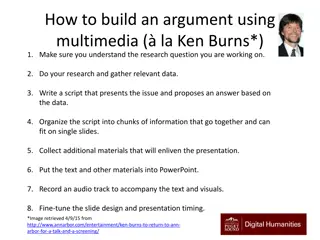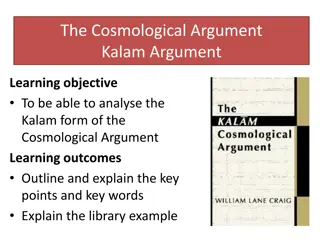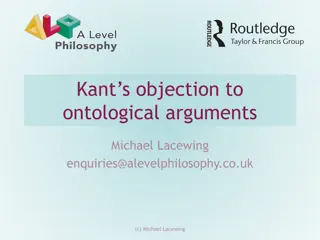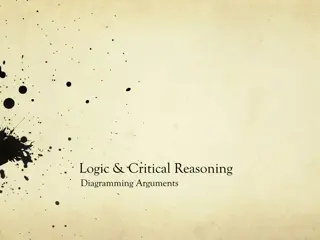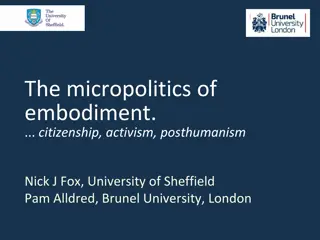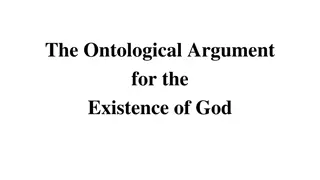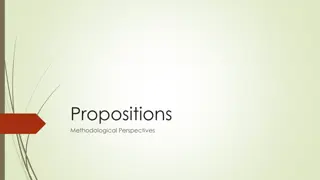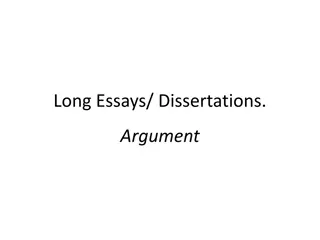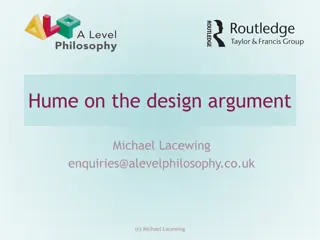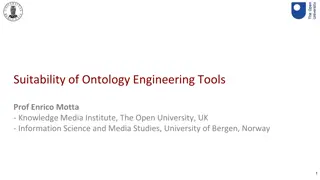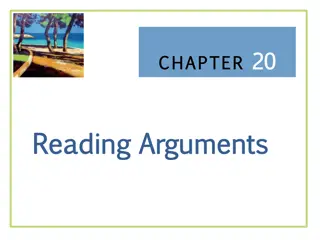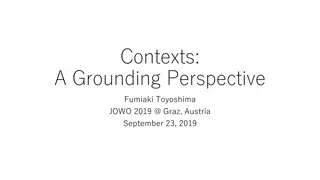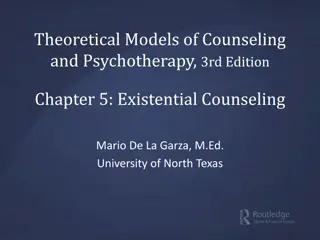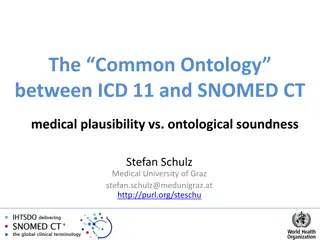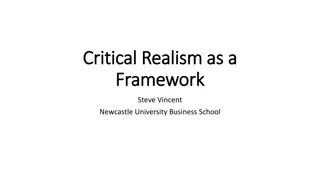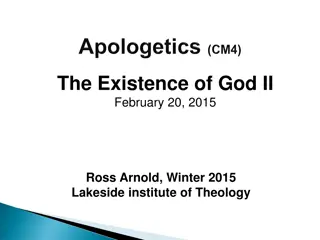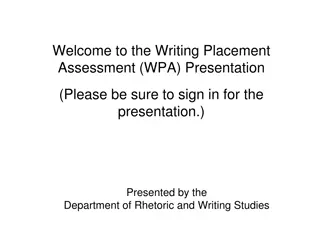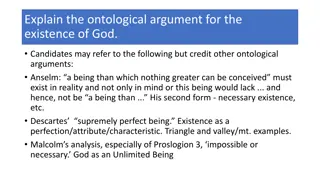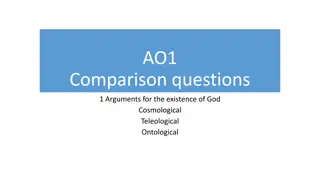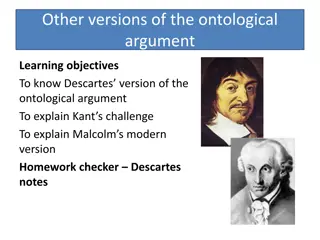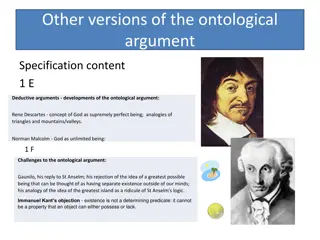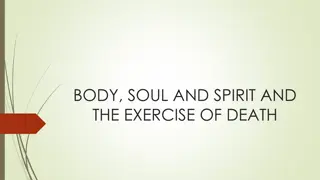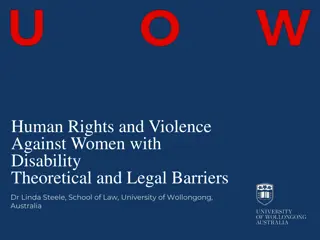The Semantic Argument for the Existence of God - International Conference Insights
Explore the Semantic Argument and its implications for the existence of God as presented by Emanuel Rutten at the International Proofs of God's Existence Conference. The lecture delves into universal properties, formal versus non-formal properties, and the likelihood of God's existence based on thes
0 views • 14 slides
Coherence and Cohesion
Cohesion and coherence play crucial roles in academic writing by ensuring logical flow and connection between ideas. Cohesion involves linking sentences using devices like conjunctions, pronouns, and repetition, while coherence focuses on organizing ideas into paragraphs that logically develop the a
0 views • 13 slides
Introduction to 1st Order Predicate Logic in Logical Thinking
Explore the limitations of propositional logic and the enhanced expressive power of 1st order predicate logic (PL1). Understand how PL1 allows for analyzing the structure of atomic propositions and proving arguments that depend on these structures. Through examples and valid argument schemata, delve
1 views • 26 slides
A New Ontological Argument
Explore a pathway from the concept of God to the existence of God by examining obstacles in reasoning such as empty concepts, empty worlds, and the limits of reason. Refute misconceptions and provide a larger perspective on the results.
0 views • 28 slides
Descartes' Cosmological Argument and Existence Inquiry
Descartes presents a cosmological argument questioning the existence of anything, focusing on what causes his own existence. He explores different aspects such as perfection, dependency, and the idea of God as a necessary cause for existence. Challenges about the nature of continued existence are al
0 views • 17 slides
Understanding the Five Parts of a Classical Argument
The classical argument is composed of five main parts: Introduction, Narration, Confirmation, Refutation and Concession, and Summation. Each part plays a crucial role in presenting a well-structured and persuasive argument, with devices and strategies such as diction, syntax, and figurative language
0 views • 6 slides
Year 5 English Home Learning - Spelling and Balanced Argument Activities
Explore Year 5 English home learning activities for the week, including a spelling lesson using Oxford Owl, practicing challenging words, and planning a balanced argument on whether mobile phones should be allowed in school. Enhance your spelling skills and critical thinking through engaging tasks a
1 views • 20 slides
Exploring Key Characteristics of Qualitative Research in Psychology
The lecture series delves into the values, characteristics, and theoretical foundations of qualitative research, emphasizing the differences from quantitative methods. It explores experiential and critical qualitative camps, subjectivity, reflexivity, and ontological and epistemological foundations.
4 views • 18 slides
Understanding the Key Elements of an Argument
An argument is an intellectual process that involves a series of connected statements to establish the validity of a proposition. This process typically includes elements such as a hook, claim, support with reasons and evidence, and counterclaims with concessions and refutations. Each element plays
0 views • 13 slides
Preparing for Oral Argument in the Eleventh Circuit: Essential Tips
Understand the process of oral arguments in the Eleventh Circuit, including when to request oral argument, FRAP 34 guidelines, and how to handle the notice of oral argument. Get insights on making the most of oral argument opportunities and potentially shaping circuit law.
0 views • 32 slides
Understanding Indirect Proofs: Contradiction and Contraposition Examples
Indirect proofs offer a roundabout approach to proving statements, with argument by contradiction and argument by contraposition being the main techniques. Argument by contradiction involves supposing the statement is false and deriving a contradiction, while argument by contraposition relies on the
1 views • 18 slides
Understanding Valid and Invalid Arguments in Mathematics and Logic
In mathematics and logic, determining the validity of an argument depends on its form rather than its content. An argument is considered valid if the conclusion necessarily follows from the premises. This determination involves analyzing the abstract form of the argument, constructing truth tables t
0 views • 32 slides
Exploring Aquinas' Arguments for the Existence of God
Aquinas presents compelling arguments for the existence of God through the First and Second Ways, highlighting the necessity of a first cause and sustaining causes in the world. By delving into concepts of temporal and sustaining causes, Aquinas builds a philosophical framework that leads to the con
6 views • 16 slides
Should Students Have Homework? Crafting a Persuasive Argument
Crafting a persuasive argument on the topic of whether students should have homework, this piece presents a well-structured approach for expressing an opinion effectively. It guides the reader through forming an introduction with a clear position, developing supporting points in body paragraphs, and
0 views • 10 slides
Understanding Reasonable Arguments vs. Pseudo-Arguments
The provided content focuses on distinguishing between reasonable arguments and pseudo-arguments through thought-provoking questions such as the ethical treatment of animals, city subsidies for sports venues, and subjective opinions on aesthetics. It also explains the structure of an argument, highl
0 views • 18 slides
Subject-Object Asymmetries in Zazaki Argument Ellipsis
Many languages allow argument ellipsis (AE), where an argument can be omitted for sloppy or quantificational interpretations. Subject-object asymmetries arise in languages due to subject-verb agreement. This study presents evidence from Zazaki, a Northwestern Iranian language, challenging the anti-a
0 views • 28 slides
Creating a Persuasive Multimedia Argument
Harness the power of multimedia, following a comprehensive process similar to Ken Burns, to build a compelling argument by understanding the research question, conducting thorough research, scripting the issue with data-backed answers, organizing information effectively, incorporating additional mat
0 views • 12 slides
An Examination of Ontological Arguments for God's Necessary Existence
Various ontological arguments, such as Malcolm's and Anselm's, propose that the existence of God is logically necessary, grounded in the concept of God as the greatest possible being. These arguments challenge the coherence of the concept of God and counter objections, like Kant's claim that existen
2 views • 10 slides
Understanding the Kalam Argument in the Cosmological Debate
The Kalam Argument, a form of the Cosmological Argument, asserts that everything with existence has a cause, including the universe. Developed by thinkers like al-Kindi, al-Ghazali, and William Lane Craig, it aims to prove that God was the initial cause of the universe. This argument suggests that t
0 views • 17 slides
Kant's Critique of Ontological Arguments
An exploration of Kant's objection to ontological arguments, examining the flaws in the reasoning of Anselm and Descartes. Kant argues that existence is not a predicate and does not enhance the concept of a being. Therefore, ontological arguments cannot prove the existence of God solely through conc
0 views • 7 slides
Exploring Argument Structure and Diagramming in Critical Reasoning
Understanding the two types of argument structures - atomic and complex, with examples and diagrams. Learn how argument diagrams visually represent the structure of an argument, identify significant units like premises and conclusions, and distinguish main conclusions from sub-conclusions. Dive into
1 views • 10 slides
Exploring Embodied Citizenship from a Materialist Perspective
This exploration delves into the concept of embodied citizenship through a materialist lens, challenging essentialist and sociological viewpoints. It discusses the ontological implications of materialism, emphasizing the contextual capacities of bodies and dissolving dualisms seen in traditional per
0 views • 22 slides
Understanding Anselm's Ontological Argument for the Existence of God
Anselm's Ontological Argument posits that the greatest possible being, referred to as God, must exist in reality because existing in reality is greater than existing only in thought. This argument centers on the concept of necessary vs. contingent beings and the idea that the greatest being cannot e
0 views • 32 slides
Understanding Propositions: Methodological Perspectives and Argument Structure
Explore the concept of argument structure, propositions, and states of affairs within sentence meaning. Learn about different types of propositions based on verb relations and delve into event and state propositions. Understand how propositions can take various grammatical forms and their significan
0 views • 19 slides
Mastering the Art of Argument in Essay Writing
Embrace the challenges of essay writing by understanding the essence of crafting a strong argument. Learn how to structure your thoughts logically, present evidence convincingly, and engage your readers effectively. Discover the importance of argument in various fields of life and the vital role it
0 views • 20 slides
Analyzing Hume's Critique of the Design Argument by Michael Lacewing
The design argument contends that the intricate order in the universe suggests a designer. Michael Lacewing delves into Hume's objections to this argument, highlighting how the analogy between human-made objects and the universe falls short in establishing a similar cause. Hume questions the logic o
0 views • 10 slides
Challenges and Opportunities in Ontology Engineering Tools
Prof. Enrico Motta discusses the limitations of current ontology engineering tools, emphasizing the need for better support for creating ontological specifications. The lack of tools that offer a knowledge-level perspective and assist in sensemaking, navigation, and identifying relevant definitions
0 views • 5 slides
Understanding the Basic Components of an Argument
This chapter delves into the fundamental aspects of constructing and analyzing arguments. It explores the elements of an argument, such as the issue, claim, support, and refutation. Through readings on organ donation and tipping, it guides readers on actively engaging with and critically evaluating
1 views • 15 slides
Understanding Contexts: A Meta-Ontological Approach
Ontologies provide a general representation of reality, but knowledge is mostly context-dependent. Analyzing different types of contexts, from linguistic to manufacturing, remains a challenge. This study aims to deepen the understanding of the ontological nature of contexts by leveraging a meta-onto
0 views • 14 slides
Understanding Existential Counseling: Philosophy and Practice
Existential counseling is rooted in the philosophy of existentialism, focusing on concepts such as responsibility, freedom, and the unique subjective perspective of each individual. Rollo May's influence in this approach, along with the ontological and phenomenological underpinnings, shape the under
0 views • 24 slides
Ontological Basis in ICD-11 and SNOMED CT Harmonization
This study explores the alignment and harmonization of the ontology between ICD-11 and SNOMED CT, emphasizing the importance of a common ontological foundation for optimal interoperability in healthcare data coding and terminology. The collaboration aims to merge clinical terminologies to enhance pl
0 views • 12 slides
Exploring Critical Realism as a Framework
This topic delves into the use of Critical Realism as a framework to develop knowledge about the social world, combining conceptual parts to bridge theoretical gaps and critique existing theories. It discusses ontological commitments, realist ontology, meta-theory, and domain-specific theories, emph
0 views • 22 slides
Philosophical Apologetics: Arguments for the Existence of God
Philosophical apologetics presents various arguments for the existence of God, including the ontological, cosmological, teleological, moral, transcendental, and presuppositional arguments. These arguments cover diverse aspects such as change, causality, design, contingency, miracles, consciousness,
0 views • 10 slides
Understanding SDSU's Writing Placement Assessment (WPA)
SDSU's GWAR, an argument-based Writing Placement Assessment, requires students to write an essay analyzing a given argument. Scores range from 2-10, with different score bands dictating course requirements. Achieving a perfect score is subjective, emphasizing clear and concise argument analysis. Som
0 views • 35 slides
Ontological Argument for God's Existence and Challenges
The ontological argument posits that a being than which nothing greater can be conceived must exist in reality, not just in the mind. Critics challenge this argument, citing issues with defining God and debating whether existence can be a characteristic. Gaunilo and Kant present criticisms focusing
0 views • 30 slides
Comparison of Arguments for the Existence of God
The comparison explores the Cosmological, Teleological, and Ontological arguments for the existence of God. It delves into the similarities and differences between key proponents such as Aquinas, Paley, William Lane Craig, and Tennant. Each argument is examined based on its form, empirical evidence,
0 views • 10 slides
Exploring Different Versions of the Ontological Argument
This content delves into various versions of the ontological argument, including Descartes' and Kant's perspectives. Descartes sought to prove God's existence through reason alone, emphasizing the innate conception of a supremely perfect being. The challenges posed by Kant and Malcolm to this argume
0 views • 24 slides
Exploring Various Versions of the Ontological Argument
This content delves into different versions of the ontological argument, including developments by philosophers like Rene Descartes and challenges posed by Gaunilo and Immanuel Kant. An exploration of the concept of God as a supremely perfect being is presented, along with key arguments and objectio
0 views • 27 slides
Understanding the Body, Soul, and Spirit Paradigm in Human Existence
Exploring the concept of ternary anthropology introduced by French anthropologist Michel Fromaget, which views humans as composed of body, soul, and spirit. This paradigm, rooted in both Eastern and Western traditions, delves into the ontological value of the mind and the overall human experience. T
0 views • 36 slides
Violence Against Women with Disability: Theoretical and Legal Barriers
Troubling the assumed dis/connections between gender, disability, the human, law, violence, and feminism. Examining epistemological, material, legal, political, and ontological limitations in addressing violence against women with disability. Discusses the prevalence, forms, and implications of viol
0 views • 11 slides


